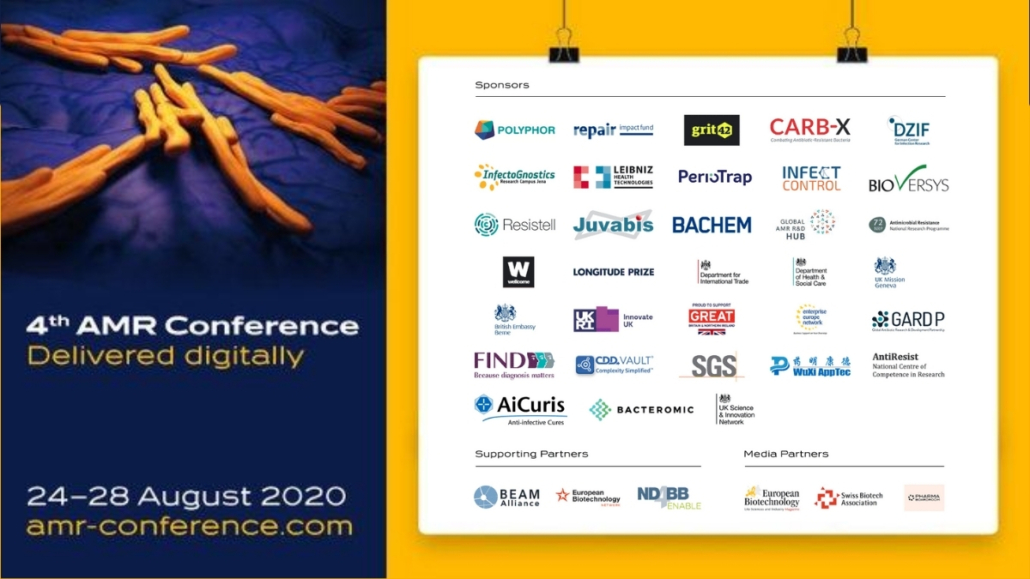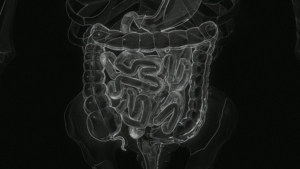
Stakeholders push for further pull incentives
With around 450 attendees, the five-day digital conference particularly focused on market conditions and financing. SMEs and global partners urged for more pull incentives.
From August 24th to 28th, around 450 international experts discussed a whole range of topics for the global Antimicrobial Resistance (AMR) community at the digital 4th AMR Conference. Whether researching medium-sized companies in biotech or diagnostics, big pharma, diagnostics corporation or clinician, human or veterinary medicine experts, whether investor or scientist – with high-level panels and expert sessions, the digital conference brought together many international players in the field of antibiotic resistance in an exchange of the latest trends and developments.
On the first day, a high-level panel of health experts, biotech and diagnostics companies and public institutions discussed the impact of COVID-19 on the AMR ecosystem. For the infection research experts one thing was clear: while COVID-19 puts the health system to an acute stress test, in which ad-hoc solutions must be found, antibiotic resistance with around 750,000 deaths annually is a creeping slow pandemic crisis that has long been there – but doesn’t get the same attention. "We must prepare now so that the slow and creeping crisis does not hit us with even greater force," emphasized Manica Balasegaram, director of the multi-government-backed global organization GARDP in the opening session on August 24. Rafael Cantón, head of clinical microbiology at the Ramón y Cajal University Hospital in Madrid emphasized that bacterial infections are becoming more and more common as secondary complications in severe COVID-19 courses and that both pandemics are already closely linked in the clinical context. Stefanie Deinhardt-Emmer, diagnostics expert from the Institute for Medical Microbiology at the Jena University Hospital confirms: "Fast and valid diagnostics will play a decisive role in the fight against COVID-19 and the accompanying bacterial infections in the coming winter."
The focus of the discussion: How can market conditions for antibiotics be improved?
Discussions around politicy measures and better market conditions played an important role at the conference. Experts have long agreed that the current situation is extremely challenging for companies active in this field. Above all, the reimbursement procedures, which are currently linked to prescription volume, as well as the currently prevailing low prices for generics, make the market so unattractive that over the past few decades more and more large pharmaceutical companies have withdrawn from research and development of new antibiotics. As a result fewer new antibiotics entered the market. For years there has been a debate in the AMR community about which so-called pull incentives governments can use to boost demand. Several sessions at the conference dealt with this topics. Among others, the pilot project in Great Britain was discussed, which should enable reimbursement of new antibiotics on the basis of a Netflix-like model.
BEAM Alliance and global partners publish post-conference call to European politics
At the end of the conference, major stakeholders summarized their position in a post-conference paper. Here, the research-based small and medium-sized companies from the European BEAM Alliance, together with international pharmaceutical companies and investors, turn to Europe: They call on the politicians of the EU Commission, the EU Parliament and the governments of the member states to develop new reimbursement models as soon as possible to develop and implement. (Click here for the paper)
The paper developed by the European SME association BEAM Alliance was published at the end of the conference with the support of the US SME initiative The Antimicrobials Working Group (AWG), the US biotech organization BIO, the public organization Global Antibiotic Research and Development Partnership (GARDP), the International Council of Biotech Associations (ICBA), the industry organization International Federation of Pharmaceutical Manufacturers & Associations (IFPMA), the investor Novo Holdings REPAIR Impact Fund, the pharmaceutical company Pfizer Inc., the international Working to Fight AMR initiative and from Kevin Outterson, Professor, Boston University & Chief Executive Officer of CARB-X.
Marc Gitzinger, CEO of the Swiss BioVersys AG and Vice President of the BEAM Alliance, underlined the great need for better political framework conditions for the antibiotics market. The existing pull incentive initiatives in Great Britain, Sweden and the USA are given an important pioneering role, but it should not stop there. We need a pan-European initiative. Europe can and must take a leading role, emphasized Gitzinger during the closing session of the AMR Conference on August 28th. Only recently, his company announced 17-million-EUR-financing round to advance BV100, a new formulation of an antibiotic against the multiresistant Gram-negative bacterium Acinetobacter baumannii, and BVL-GSK098, a novel tuberculosis drug co-developed with GlaxoSmithKline towards first in man studies starting this year.
Dame Sally Davies, UK special envoy of AMR in the government, welcomed the BEAM Alliance post conference paper and stressed that one country alone will not be able to rise to the challenge. We have to make sure that we all cross the finish line, she emphasized, describing the current situation with a lobster in the saucepan that is slowly but surely boiled soft and dies if we don’t manage to cool the water. MEP Tiemo Woelken, invited to the conference as a representative of the "European Parliament MEP Interest Group on AMR", announced support from parliamentarians: "The topic of AMR must be approached by politicians and industry as a team play." He wants to work to ensure that the subject is put on the agenda by the EU Commission in the context of the negotiations on the new European pharmaceutical strategy and that it is also pushed forward during the German EU Council Presidency.
India announces increased initiative
It became very clear at the AMR Conference that many actors around the world have already committed themselves to the fight against antibiotic resistance. "The issue is global and we will only get a grip on it in the long term," emphasized Renu Swarup from the Indian Ministry of Research as the representative of the Indian government at the closing session on August 28th. She wants to work at government level to ensure that developing countries like India also work internationally for better framework conditions – for instance within the framework of the G20. The COVID-19 crisis shows us that we can build structures together and join forces globally. This way, we should also fight antibiotic resistance, said Renu Swarup.
Catharina Boehme from the Geneva-based diagnostics-focused organization FIND summarized her lessons from the corona pandemic at the conference: "One important finding is very clear: if the political will is there, the world community is able to drive innovation."
AMR Action Fund and "Investor Action on AMR" initiative
On Thursday, August 27, several initiatives within the AMR community were presented that address the challenges in the area of financing. In a session, the AMR Action Fund, founded in July by more than 20 global pharmaceutical companies, presented further details of its future activities. As Silas Holland from the pharmaceutical company Pfizer reported, they want to be operational by the end of 2020 and start the 5-year investment period in the first quarter of 2021. In order to sensitize even more investors to the topic of antibiotic resistance in the long term, the British government presented the "Investor Action on AMR" initiative in a separate session at the conference. Several representatives of different investors – such as the FAIRR Initiative, Rathbone Investment Management and BMO Global Asset Management – explained their view of the AMR investment case. (Note: The session is freely available. A recording can be viewed here on Youtube)
Biotech company AiCuris starts its own incubator program
But biotech companies are also taking the initiative into their own hands, as the example of AiCuris from Wuppertal shows. The infection specialists presented their new AiCubator program at the conference, with which they want to support early approaches in the development of new antibiotics in a targeted manner. This is part of the larger PREP – Pandemic and Resistance Emergency Preparedness program with which the biotech company is bundling its infection research activities to develop pandemic solutions. "We want to drive innovations in this area as quickly as possible and want to pool our resources together with external input," said CEO Holger Zimmermann at the conference.
++++ FREE SESSION RECORDINGS ++++
The recordings of two session during 4th AMR Conference are available for free and can be viewed on Youtube:
Spotlight on UK | The Investor Action on AMR
https://lnkd.in/erMbNQK
Closing Session | The future of AMR – How a new post COVID19 policy roadmap could look like https://lnkd.in/e4Y-h6K
See more details on the conference: www.amr-conference.com


 Unsplash+
Unsplash+
 Unsplash+
Unsplash+